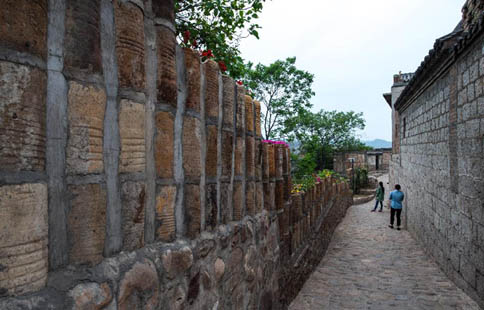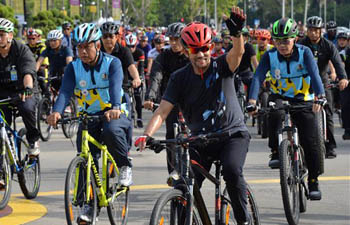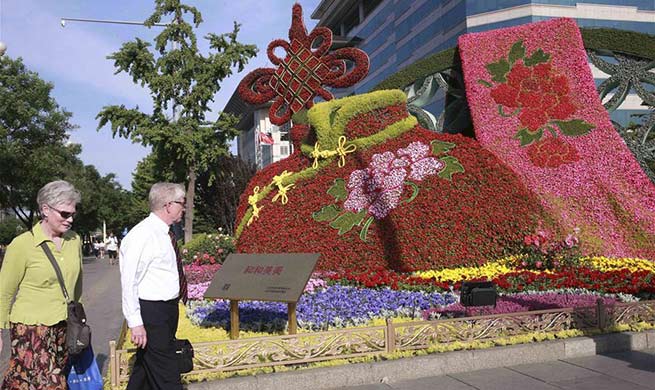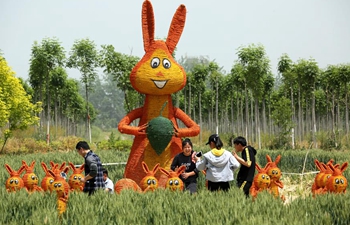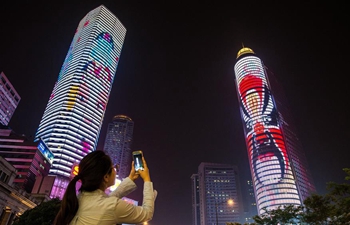By sportswriter Ji Ye
BEIJING, May 9 (Xinhua) -- The marketing director for the Genting Resort Secret Garden, the 2022 Beijing Winter Olympic Games ski venue in Chongli district of north China's Zhangjiakou, Zhao Qiong recently shared with Xinhua his experience in recruiting children for Genting's ski winter camp.
"In 2013 we opened a winter camp aimed at six-to-nine-year-old children. At the time, we had to beg schools for more children using promotional prices. Two years later, more than 300 children are enrolled in our winter camp. In the winter of 2016, although the price for the camp rose to eight thousand yuan, the number of applicants soared to 2,800. That is near ten times more than in 2015."
"Many friends called me to enroll their kids in the winter camp, but I can't as the quota is limited due to the size of the venue, accommodation and number coaches."
Zhao's experience reflects the boom in China's skating and ski industry after Beijing and Zhangjiakou successfully bid to host the 2022 Winter Olympics.
China aims to encourage a staggering 300 million people to take part in winter sports as part of the ramp-up to 2022. The 300 million winter sports participants does not only refer to athletes, coaches and enthusiasts, but also includes audience members and volunteers.
In accordance with China's winter sports development plan, the total size of the national winter sports industry by 2020 will reach 600 billion yuan, skyrocketing to one trillion yuan by 2022. The 2022 Winter Olympics has put winter sports development on a fast track, with more public interest and government support.
Lin Xianpeng, vice president of the management school of the Beijing Sports University, believes that China's winter sports era has entered its so-called "Golden Twenties."
China's northeastern provinces have long been one of the main forces behind winter sports in the country. But as of late, winter sports are beginning to enter their "spring" all across the country.
Li Yu, 11, is one of over 3,000 Beijing boys for whom ice hockey carries life-changing significance. This summer, he will go to Canada to play ice hockey, following in the steps of his predecessors like Song Andong, who was drafted in the 2015 NHL Entry Draft by the New York Islanders.
"When Li Yu started playing ice hockey eight years ago, there were about 300 kids in Beijing playing this sport, now the number has surpassed 3,000," said Feng Fei, general manager of the Huaxi International Ice Hockey Club.
"This means more and more families are getting rich, like in Canada or the United States, ice hockey is very expensive to play. Only the affluent families can afford it," said Feng.
China has become an increasingly affluent society, and in recent years levels of per capita disposable income grew rapidly. Sport is likely to be a beneficiary of such a rise in disposable income levels.
Sports industry expert Bao Mingxiao says that when the per capita disposable income surpasses 5,000 U.S. dollars, fitness and outdoor sports will enjoy faster development. With a per capita disposable income of over 8,000 U.S. dollars, sports will become one of the important pillar industries in the national economy. According to the statistics, in 2016, China's urban per capita disposable income was close to 5,000 U.S. dollars, and is expected to reach 8,000 U.S. dollars in 2022. Therefore Chinese people's spending in winter sports will enjoy correspondingly rapid growth.
Combining sports with education is another feature in Beijing's winter sports promotion efforts. The capital city has established 52 winter sports schools. Dean of the Magic Ski School Zhang Yan, who has focused on ski training in Beijing and Zhangjiakou for nearly ten years, already feels the benefits brought by Beijing 2022.
"Previously, many schools in Beijing considered skiing as a dangerous sport that they did not let us teach, even the ski lessons we provided for free were not allowed. But now, we are warmly invited to school and they pay for the ski lessons," said Zhang.
"I think China's winter sports will only take five years to reach the achievement level which other countries spent 50 years getting to," Zhang added.
In anticipation of Beijing 2022, Zhangjiakou is transforming into a popular ski and holiday destination for ski enthusiasts from surrounding countries and regions.
Currently, there are six existing ski resorts in operation, making the city a leader in China's national ski industry. The Chongli district has a population of 126 thousand, among which 30 thousand people are working for the ski industry directly or indirectly.
To engage more fans from south of the Yangtze River, China's Winter Sports Administrative Center launched a long-term program of "moving ice sports from north to south," and Beijing 2022 is speeding that process up.
Yang Yang, the current International Olympic Committee member and China's former short track speed skating Olympic champion, was also keen to stay involved in short track following her competitive retirement in 2006. She opened the FeiYang Skating Center in Shanghai in June 2013 to help promote ice sports in southern China.
Yang said the rinks at her Feiyang Skating Center were fully booked almost every weekend, with parents sending their tottering young children onto the ice.
"It's easy to find a rink inside a shopping mall in southern big cities like Shanghai, so why not give children another choice for exercise?" said China's first-ever Winter Olympic gold medalist.
"China's southern region fully meets the requirements for winter sports promotion. America's figure skating star Michelle Wingshan Kwan is from Los Angeles. That city has the best training center in the world for ice hockey and figure skating. So region and temperature are not really problems for ice sports."
In China's northwestern regions, more and more families are also beginning to spend spare time on winter sports. The Xinjiang Sports Administration has taken measures to provide a better environment for people in the region to take part in winter sports. During the 2017 spring festival, tourist visits to the Silk Road Resort reached 42,000, a year-on-year increase of 30 percent.
Xinjiang has also been making efforts in winter sports infrastructure construction, with projects to build venues for ski jumping, cross-country skiing and freestyle skiing. Xinjiang is also planning to host a winter sports meeting for teenagers called Stars of the Future, in a bid to stimulate youngsters' interest in and passion for winter sports.






